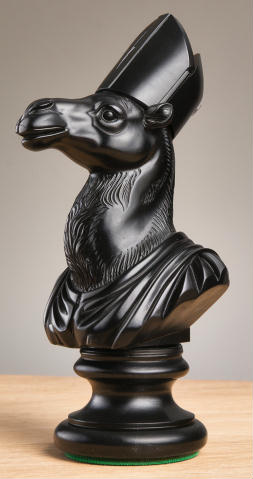Piececlopedia: Bishop-Camel compound (Caliph, Flying Dragon)
Historical notes

The Caliph is a piece that combines the movement possibilities of the Bishop and Camel. It first appeared under the name Flying Dragon in Mark Hedden's Ganymede Chess, and was reinvented independently as a Caliph by Charles Gilman as part of a quartet with the Marshal, Cardinal, and Canvasser. It was used in this way in Ecumenical Chess and its 3d offshoot Ecumenical Eurasian Ninjachess. The name Caliph is intended to suggest its components. It is a title from the early days of Islam, a religion that began among a nomadic people who use camels and has since spread to other such peoples (as well as more settled people who don't, but that is incidental). The first two letters are chosen for extrapolation to Bishop compounds with other odd:odd oblique leapers by making the same substitution as From Ungulates Outwards suggests for the oblique leaper itself. Thus Bishop plus 5:1 Zemel is Zeliph, and so on.
Movement
The Caliph can move like a Bishop or a Camel. Unlike the Cardinal or Canvasser, both its components are colourbound in the same way, and therefore the Caliph itself is. This means that two are required to cover the whole board. This does however make it a very exact sum of its parts, so that concentrating the strength of the Wildebeest Chess back rank into just seven pieces would be more accurately done with Marshals and Caliphs than with Cardinals and Canvassers. Another way to view the Caliph is as a Marshal with all its move lengths multiplied by root 2 and turned through 45 degrees.
Movement diagram
The black circles indicate the leaping moves of a Camel, while the green circles indicate the Bishop move.
![]()
![]()
![]()
![]()
![]()
![]()
![]()
![]()
![]()
![]()
![]()
![]()
![]()
![]()
![]()
![]()
![]()
![]()
![]()
![]()
![]()
![]()
![]()
![]()
![]()
![]()
![]()
![]()
![]()
![]()
![]()
![]()
![]()
![]()
![]()
![]()
![]()
![]()
![]()
![]()
![]()
![]()
![]()
![]()
![]()
![]()
![]()
![]()
![]()
![]()
![]()
![]()
![]()
![]()
![]()
![]()
![]()
![]()
![]()
![]()
![]()
![]()
![]()
![]()
This is an item in the Piececlopedia: an overview of different (fairy) chess pieces.
Written by Charles Gilman. AI image added by Fergus Duniho.
WWW page created: June 23, 2005.
Last updated: November 22, 2024.